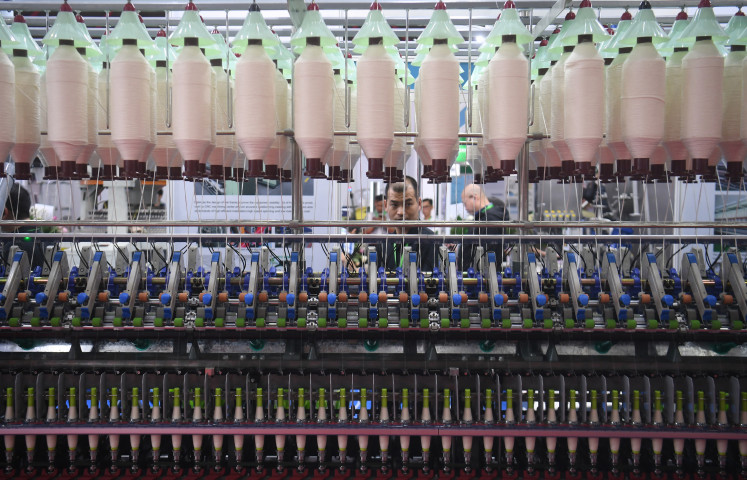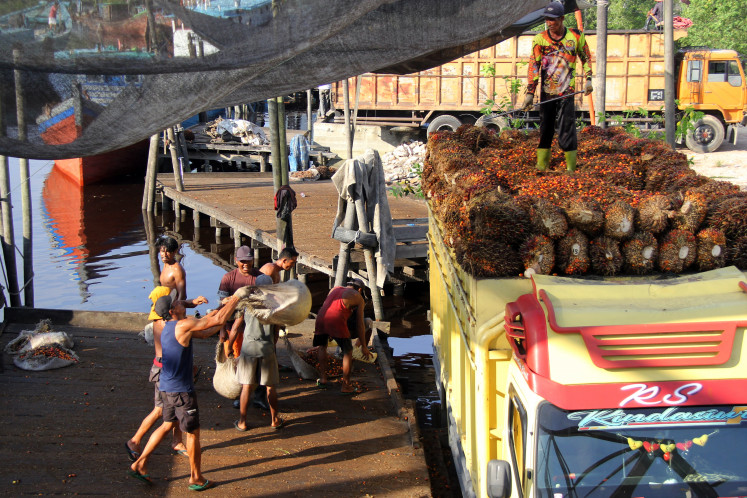Popular Reads
Top Results
Can't find what you're looking for?
View all search resultsPopular Reads
Top Results
Can't find what you're looking for?
View all search resultsTemoo aims to link informal workers to new clientele
Elitha Tarigan, a 29-year-old worker, uploaded a picture of a pile of unironed clothes in her boarding house to a message group
Change text size
Gift Premium Articles
to Anyone
E
litha Tarigan, a 29-year-old worker, uploaded a picture of a pile of unironed clothes in her boarding house to a message group.
“Does anyone know where I can hire a person to iron my clothes? I am too busy,” she asked message group members.
Her friends offered her many suggestions, ranging from ironing by herself gradually to moving to a boarding house that provided ironing services. However, none of them could suggest her a person that she could hire temporarily to finish her piling house chores.
Elitha is not alone in her dilemma. Many people in big cities nationwide are too busy to run small errands or do house chores, while hiring full-time workers is not feasible. Big companies often require workers with a set of specific skills, but finding competent workers can be a difficult task.
Meanwhile, many people living in slum areas or urban villages have the skills and capabilities to get the job done.
Maral Dipodiputro, Gustian Mahardika and Gasim Alkaff, postgraduate students at Bina Nusantara University, are trying to fill in the gap in such cases with Temoo, an app that aims to bridge workers living in slum areas with those who require their services.
Maral said the idea was born when the three of them participated in a competition that required participants to double the income of poor people in five years.
According to the Jakarta office of the Central Statistics Agency (BPS), the number of poor people in Jakarta as of September 2015 stood at 368,000. Most of them earn between Rp 20,000 (US$1.5) and Rp 30,000 per day.
She said that they observed many efforts to increase the income of underprivileged people, especially those conducted by private companies through corporate social responsibility (CSR) programs.
They usually taught residents new skills, such as how to make products out of recycled materials, which the companies would then purchase from them, she added.
“We consider that ineffective and not sustainable,” she said.
She added that the team then worked to discover the skills that residents had already honed. “Poor people have strong survival instincts. Most of them have various skills and capabilities,” she said.
The team found that the residents knew how to do laundry, sew, clean houses and were skilled in crafting and construction work, among others.
She said, however, that those people faced difficulties in accessing employment.
“Therefore, we want to create a database of these workers and their capabilities to access employers through a mobile app,” she said.
Maral said that according to the team’s survey, many poor people owned mobile phones and smartphones, therefore many would be able to access the app. “Those who do not own a smartphone can still register through their mobile phones via text message,” she said.
She said that Temoo also had talent scouts, dubbed Agents of Change, who were tasked with gathering skills data and workers’ information. “These agents will help us select and ensure that those registered really need jobs and have skills,” she said.
“For our pilot project, we gathered 300 workers in Sunda Kelapa [North Jakarta] from our agents,” she said.
She said that her team also received data on 10,000 workers from the Jakarta Employment Agency.
Maral said that the system was still under development and welcomed suggestions to improve the app through temoo-app.com.
Gugun Muhammad of the Urban Poor Consortium (UPC), an organization that empowers poor people in North Jakarta, said that he supported the app as it helped workers promote their skills.
“My tailor neighbor, for example, lacks clientele as people only know of his services through word-of-mouth,” he said.
He added that the tailor was unable to open a workshop in a high-density area on account high rent. “The app will enable him to promote his services to a wide range of people,” he said.
When asked about the app, Elitha was enthusiastic. “I think its a great idea. I hope it can cover all workers, especially residents who were forcefully evicted to low-cost apartments and lost their jobs,” she said.










